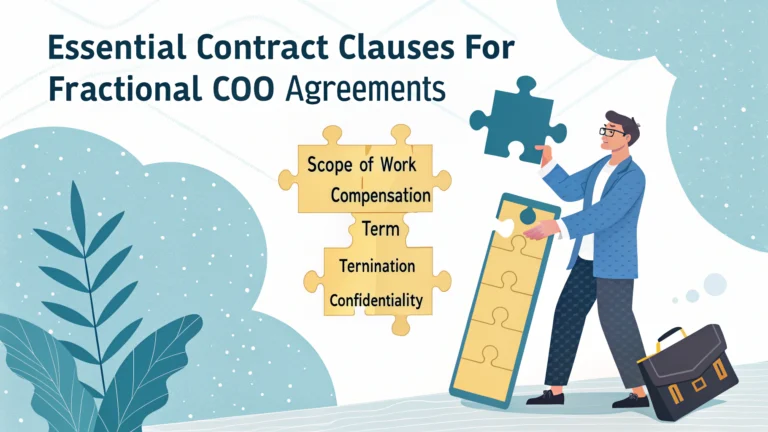A well-structured contract is the foundation of any successful fractional COO engagement.
Clear contract terms protect both parties and set expectations for responsibilities, deliverables, and compensation.
This guide outlines the essential clauses every fractional COO agreement should include to establish a productive working relationship.
Key Contract Elements
- Scope of Services & Responsibilities
- Term & Time Commitment
- Compensation Structure
- Confidentiality & Non-Disclosure
- Intellectual Property Rights
- Termination Conditions
- Performance Metrics
Scope of Services
Define specific areas of responsibility, such as operations management, team leadership, process optimization, or strategic planning.
List concrete deliverables and expected outcomes for each area of responsibility.
Include provisions for scope changes or additional services beyond the initial agreement.
Term & Time Commitment
- Contract duration (fixed-term or ongoing)
- Weekly or monthly hours allocation
- Availability requirements (specific days/times)
- Notice period for schedule changes
- Remote vs. on-site work expectations
Compensation Structure
Specify the payment terms, including hourly rates, retainer fees, or project-based compensation.
- Payment schedule (weekly, monthly, milestone-based)
- Expense reimbursement policy
- Performance bonuses or incentives
- Late payment penalties
Confidentiality & Non-Disclosure
Include comprehensive confidentiality provisions to protect sensitive business information.
- Definition of confidential information
- Duration of confidentiality obligations
- Data protection requirements
- Return of confidential materials
Intellectual Property Rights
Address ownership of work products, innovations, and improvements developed during the engagement.
- Assignment of IP rights
- Pre-existing IP exclusions
- License terms for shared resources
Termination Clause
- Notice period requirements
- Grounds for immediate termination
- Exit process and handover requirements
- Final payment terms
- Post-termination obligations
Performance Metrics
Define clear success metrics and evaluation criteria.
- Key performance indicators (KPIs)
- Regular performance review schedule
- Reporting requirements
- Improvement plan process
Additional Considerations
- Insurance requirements
- Liability limitations
- Dispute resolution procedures
- Non-compete clauses (if applicable)
- Force majeure provisions
Securing Your Business Relationship
Consider having an experienced business attorney review the contract before signing.
Update the agreement periodically to reflect changing business needs and circumstances.
Keep detailed records of any contract modifications or amendments.
For professional legal guidance on fractional COO agreements, contact your local bar association or business law firm.
Implementation Best Practices
Document all processes and procedures developed during the engagement for seamless knowledge transfer.
- Create detailed operation manuals
- Establish clear communication channels
- Build sustainable systems
- Train internal team members
Risk Management
- Regular compliance reviews
- Data security protocols
- Business continuity planning
- Crisis management procedures
- Backup staffing arrangements
Relationship Management
Maintain professional boundaries while fostering productive collaboration.
- Regular status meetings
- Clear escalation paths
- Stakeholder communication plans
- Team integration strategies
Documentation Requirements
Maintain comprehensive records throughout the engagement period.
- Progress reports
- Meeting minutes
- Project deliverables
- Process improvements
- Strategic recommendations
Ensuring Long-Term Success
A well-crafted fractional COO agreement serves as the foundation for a successful business partnership.
Regular review and updates ensure the contract remains relevant and effective throughout the engagement.
Clear communication and documented expectations help both parties achieve their objectives while maintaining professional standards.
- Monitor contract compliance
- Address issues promptly
- Maintain open dialogue
- Document success stories
- Plan for future growth
FAQs
- What essential clauses should be included in a scope of work section for a fractional COO agreement?
The scope of work should clearly define specific responsibilities, deliverables, time commitment (hours per week/month), decision-making authority, and reporting relationships within the organization. - How should compensation and payment terms be structured in a fractional COO contract?
Compensation terms should specify hourly/monthly rates, payment schedule, expenses reimbursement policies, and any performance-based incentives or bonuses. - What confidentiality and non-disclosure provisions are crucial for protecting company information?
The agreement should include detailed confidentiality clauses covering trade secrets, proprietary information, client data, and specific terms regarding the duration of confidentiality obligations post-contract termination. - What termination clauses should be included in a fractional COO agreement?
Termination clauses should specify notice periods, grounds for termination (with and without cause), final payment terms, and transition requirements for ongoing projects. - How should intellectual property rights be addressed in the contract?
IP clauses should clearly state ownership of work products, innovations, and developments created during the engagement, including transfer of rights to the company. - What liability and indemnification terms should be included?
The agreement should outline professional liability limits, insurance requirements, and mutual indemnification provisions for potential damages or losses. - How should performance metrics and evaluation criteria be incorporated?
Include specific KPIs, performance review schedules, reporting requirements, and mechanisms for addressing performance concerns. - What conflict of interest provisions are necessary for a fractional COO arrangement?
Detail restrictions on working with competitors, disclosure requirements for other clients, and guidelines for managing potential conflicts of interest. - How should the contract address data protection and privacy compliance?
Include clauses ensuring compliance with relevant data protection regulations (GDPR, CCPA), data handling procedures, and breach notification requirements. - What provisions should be included regarding remote work and accessibility?
Specify expectations for availability, communication methods, response times, and any requirements for on-site presence.







